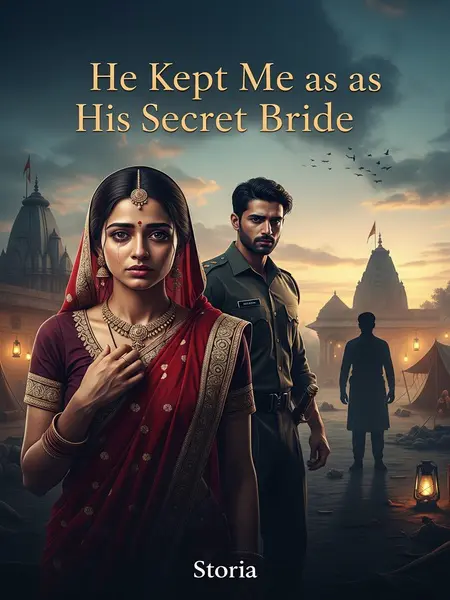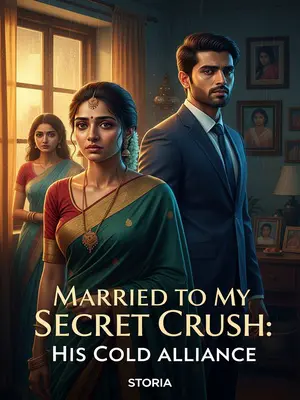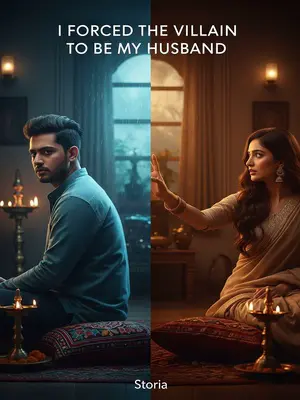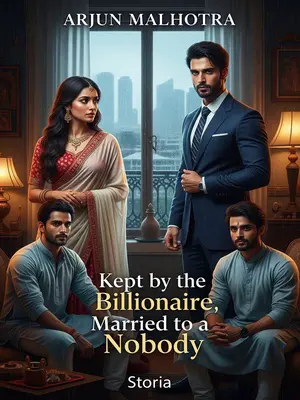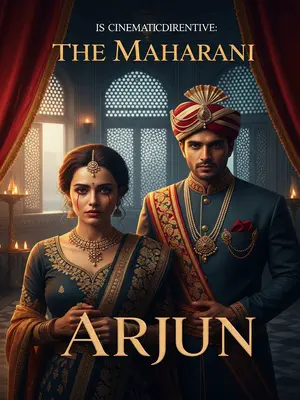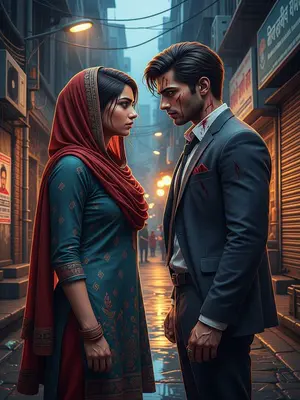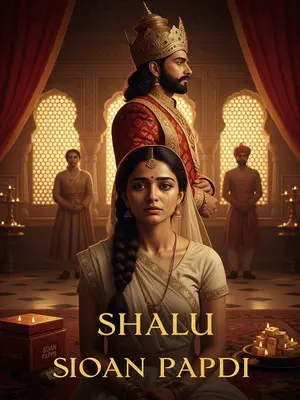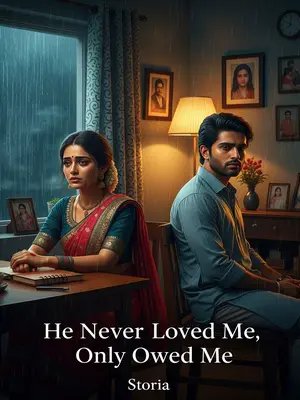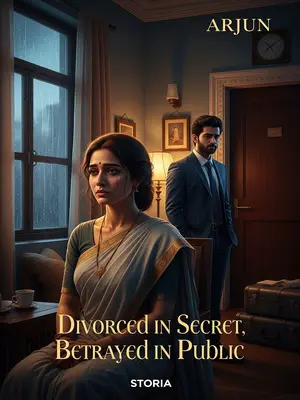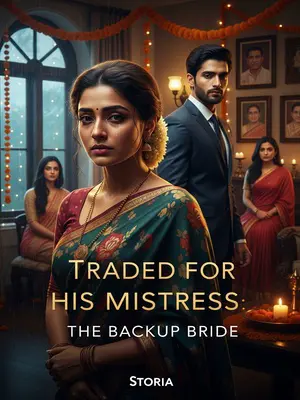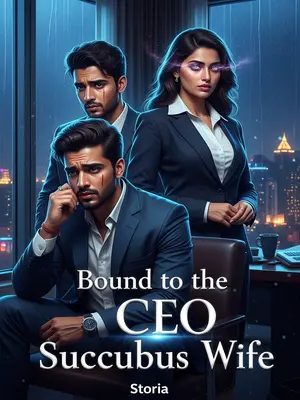Chapter 3: Old Promises, New Wounds
On the night Kabir Singh came to find me, Arjun called for me. His summons drifted through the tents like a secret. I tucked my sitar under my arm, nerves jangling. The lamps outside flickered, shadows leaping on the dirt as I passed the chowkidar, his eyes lingering too long.
Inside Arjun’s tent, he pressed me against the old wooden table, the edge digging into my hip, the lantern’s shadow flickering on the canvas wall. His hand slipped into my kurta, the other gripping my neck, forcing me to look up. The air was heavy with sandalwood, sweat, and the faint scent of burnt wick.
His kiss was wild and violent, not a trace of tenderness. His lips bruised mine, stubble scraping my cheek. I tasted iron, felt my fingers dig into the table’s edge. Tonight, he was especially rough, from table to bed, from night until dawn, saying nothing—not even my name. The hours blurred, broken only by the creak of springs, gasps for air, and the slap of skin.
By morning, I was exhausted, slumped at the bedside, the cotton sheet stuck to my skin. I stared at a patch of mould on the ceiling, willing myself not to cry. The morning bazaar’s hum drifted in—chaiwallahs setting up, milkmen’s cans clanging. My limbs ached, bruises old and new stinging.
Arjun held me from behind, nuzzling my neck, his words edged with something else. "I'm going to marry the MLA’s daughter. Are you jealous?" He paused, his voice falling low. "What right do you have to be jealous of her? Meera, you are no longer the pride of Kaveripur."
That title hadn’t been heard in years. For a moment, it sounded foreign, like it belonged to another girl. But in his mouth, it was both accusation and lament. I remembered the hush of drawing rooms, the laughter of old friends, the pride of being admired.
Back in Kaveripur, I was famous. My face brightened mehendi ceremonies and club gatherings. Asha aunty called me the city’s diamond. I sang at every festival, the pandit at the mandir blessing me with a gentle tap.
Many sons of officials admired me, and Arjun was among them. At Diwali melas, the most eligible bachelors crowded around just to watch me light the first lamp. Arjun always lingered at the edge, his gaze more insistent than the rest. He dared what others would not—sending a rose with a teasing note, winking across the schoolyard. My cheeks burned as the other girls giggled.
He would climb over my bungalow wall, risking a beating, to leave a fresh gulmohar on my windowsill. Evenings, I found the red petals, dewy, tucked in the latticework. My mother would shake her head, but I saw her smile. Neighbours gossiped, my heart thudded with excitement.
At Holi, he bribed the dancers so that when I passed by, the girls waved handkerchiefs, forming an "M" from the balcony. That Holi was legendary—the air thick with colour and music, a sudden shower of rose petals from above. My sisters squealed, Arjun grinned from behind the crowd, covered in blue and yellow gulal.
My parents scolded him for lacking propriety, threatening to send me to Banaras. But in their eyes, I saw both worry and pride. They knew what it meant to be loved so openly.
But they didn’t know, that night under the stars, he smiled wild and carefree. My heart skipped. Even now, in my darkest places, that beat lingers, soft and persistent.
Then, Rajpur and Devgarh went to war. The city’s temples filled with prayers, mothers tying protection threads on sons’ wrists. Arjun left in a rush, refusing to look back. I watched from behind curtains, unseen, fists clenched, begging for his safe return.
I didn’t get to see him off. The last train whistle faded, and I sat in the garden, alone with my longing. But the next morning, a fresh red gulmohar waited on my windowsill, cool petals pressed into my diary—a silent promise.
Underneath was a note, handwriting wild and bold—just like him. "Wait for me to return with honour, and I will marry you."
But I never got to wait for his return. The world turned upside down before he could keep his word. Our fortunes changed as swiftly as monsoon winds.
My father, for choosing the wrong side, was convicted. Our family ruined. Neighbours turned away. Our home sealed, my father’s name stricken from the club. The shame was total.
Father and brother died, mother hanged herself. I found her, swinging from the fan, her dupatta wound tight. My brother’s body came home draped in the flag, but stripped of honour. Only I remained, thrown into the army camp as a camp girl.
The first night, dozens of men broke in, laughing cruelly. They pawed at my clothes, eager to prove something. I clung to the cot, wishing I could dissolve. "This is Kaveripur’s pride, the unattainable Meera," they mocked. "Let’s see if she’s worth it."
Despair engulfed me. I remembered my mother’s last words, the tilt of her head. Dying seemed a mercy. Suddenly, someone burst in—a uniformed man, lathi bloodied. Arjun. His voice thundered, "You dare touch my woman?" The men shrank back, cowed. He knelt, hands trembling, checking my face.
After three years, seeing Arjun again—darker, thinner, a scar on his face—he held me tightly, arms a fortress. "Thank God, Meera. Thank God you’re safe." His body shook. He moved me into his tent, took me to the river, brought me mangoes. He found a sitar for me, placed it like a treasure on my bed. I played for him, and he smiled as if bathed in spring breeze. "To hear Meera play, it’s worth dying for."
For a while, hope returned. Arjun rose quickly in the ranks. With his protection, no one dared touch me. The other girls envied me. But late at night, the sounds from the officers’ tent—laughter, music—haunted me. I lied to myself that Arjun would never be among them.
Until one night, he turned me over, pressing me into a humiliating position at the bedside. Shocked, I pushed him away. He frowned. "This won’t do? They…forget it, let’s sleep." He washed up, then held me stiffly. His unfinished words echoed in my mind: All are camp girls—why just you?
My heart sank. Arjun became busier, coming to see me less and less. Some ruffians thought I’d been abandoned, sneaking into my tent at midnight, covering my mouth, their foul mouths pressed against me. I struggled, slapped across the face. My ears buzzed, my mind blanked. Fortunately, Arjun returned in time, kicked the man away, and held me.
But a few days later, I saw that man again, unharmed, laughing by the tandoor. "How could Major Arjun make trouble over a camp girl? Women are like clothes, but brothers are life-and-death comrades." Their laughter was cruel. "That woman is tender. Next time, I’ll have her." When our eyes met, he licked his lips. I fled, heart pounding.
The nightmare replayed every night. I asked Arjun about it. He sat at his desk, drumming his fingers on a file, brows furrowed. He pulled me onto his lap, hand at my neck. "Meera, his uncle is my deputy—he saved my life. I can’t deal with him. Publicly… What reason do I have to punish him? For harassing a camp girl?"
I stared blankly. His hand slipped under my saree, casual. He tried to comfort me: "You are mine. I won’t let anyone bully you. Wear more when you leave the tent…"
It was as if I met a stranger. From then on, I knew—I couldn’t rely on men. If I wanted to escape, I had to depend on myself.
